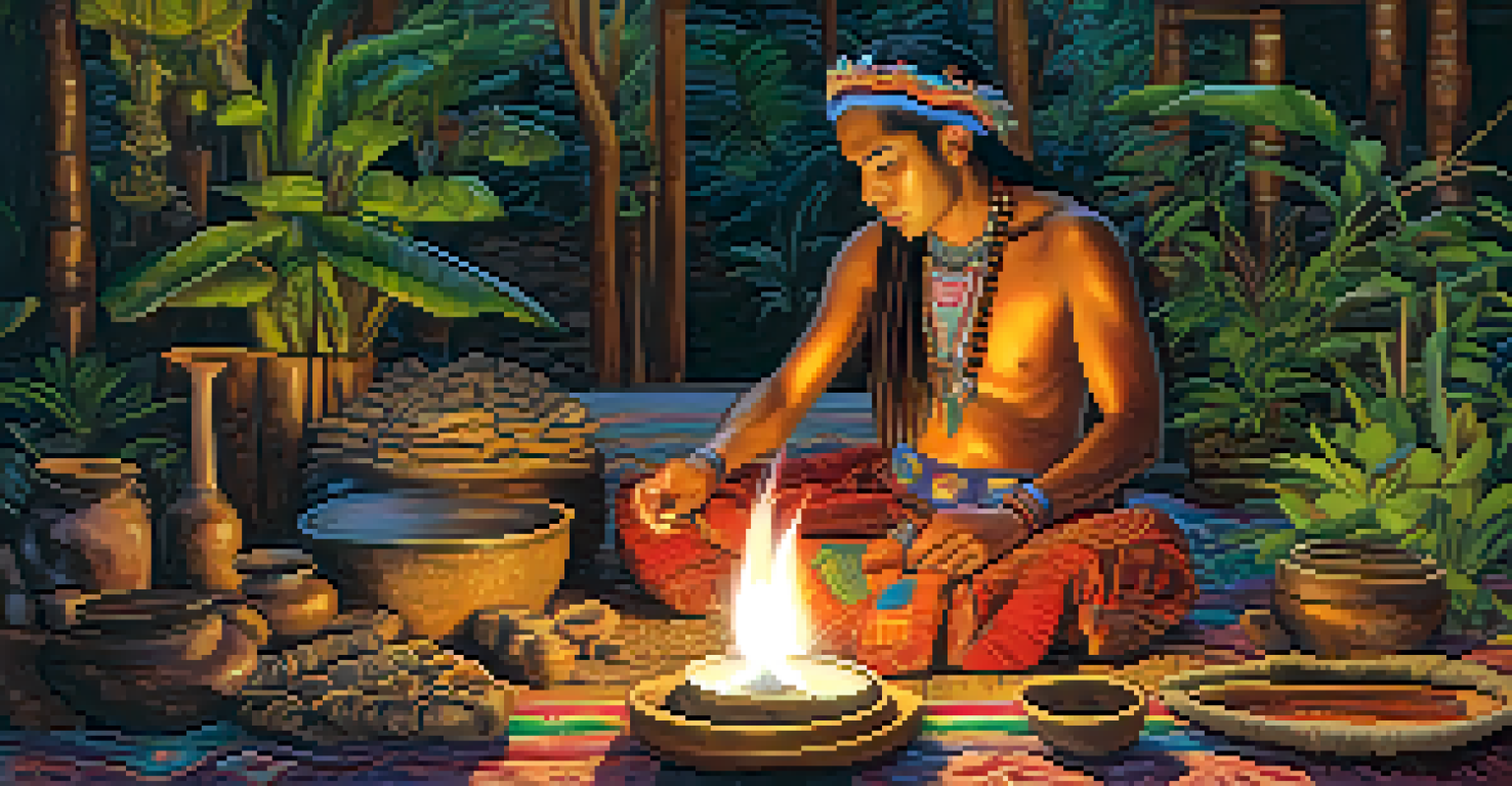Case Law: Ayahuasca and the Rights of Indigenous Peoples

Understanding Ayahuasca: A Cultural and Spiritual Context
Ayahuasca is a traditional brew made from the Banisteriopsis caapi vine and other plants, primarily used by Indigenous peoples in the Amazon for spiritual and healing purposes. Its significance goes beyond mere consumption; it is a sacred tool for connecting with the spiritual realm and community identity. In many Indigenous cultures, the use of Ayahuasca is intertwined with rituals and traditions passed down through generations, making it a vital aspect of their heritage.
Indigenous rights are human rights.
As Western interest in Ayahuasca has surged, particularly for its potential therapeutic benefits, this has raised important questions about cultural appropriation and the rights of Indigenous peoples. How can we respect their traditions while also acknowledging the growing global demand? This intersection of interest highlights the need for legal frameworks that protect Indigenous rights while navigating the complexities of modern usage.
Understanding the cultural context of Ayahuasca is crucial when discussing its legal implications. It sets the stage for why Indigenous communities assert their rights over this sacred plant and its uses, advocating for recognition in the face of commercialization and potential exploitation.
The Legal Landscape: International Treaties and Indigenous Rights
Indigenous rights are recognized under various international treaties, such as the United Nations Declaration on the Rights of Indigenous Peoples (UNDRIP), which emphasizes the importance of preserving traditional practices. These documents advocate for the self-determination of Indigenous communities, allowing them to manage their cultural heritage and natural resources. However, enforcement of these rights often varies significantly between countries.

In addition to international law, national legal frameworks also play a critical role in protecting Indigenous peoples' rights regarding Ayahuasca. For instance, countries like Brazil have made strides in recognizing the religious and cultural significance of Ayahuasca for Indigenous communities, while also grappling with the implications of its use by non-Indigenous individuals. This legal recognition is vital for empowering Indigenous voices in discussions surrounding their sacred practices.
Ayahuasca's Cultural Significance
Ayahuasca is a sacred brew integral to Indigenous cultures in the Amazon, used for spiritual and healing purposes.
The tension between Indigenous rights and the broader societal interest in Ayahuasca reflects a complex legal landscape. As more jurisdictions reconsider their drug policies in light of Ayahuasca's cultural significance, it becomes essential to ensure that Indigenous communities are at the forefront of these discussions.
Case Studies: Landmark Rulings Affecting Ayahuasca Use
Several landmark rulings have emerged that underscore the legal complexities surrounding Ayahuasca use. One notable case in Brazil involved the União do Vegetal (UDV), a religious group that uses Ayahuasca as part of its ceremonies. The Brazilian Supreme Court ruled in favor of the UDV, affirming that the use of Ayahuasca is protected under religious freedom laws, thus setting a precedent for similar cases.
Cultural appropriation occurs when a dominant culture takes elements from a marginalized culture without permission, often leading to exploitation.
In contrast, cases in other countries, such as the United States, have illustrated the challenges faced by Indigenous groups in claiming rights to Ayahuasca. Legal battles often hinge on interpretations of drug laws and religious freedom, with courts needing to balance societal concerns against the cultural significance of the brew. These cases highlight the necessity for nuanced legal approaches that respect both Indigenous rights and public health considerations.
These case studies not only illuminate the legal landscape but also emphasize the importance of Indigenous perspectives in shaping future rulings. The outcomes of these cases can have far-reaching implications for how Ayahuasca is viewed legally and culturally, influencing policies and practices worldwide.
Cultural Appropriation: A Growing Concern in Ayahuasca Use
As the popularity of Ayahuasca grows globally, so does the concern over cultural appropriation. Many Indigenous groups argue that the commercialization of Ayahuasca ceremonies, often led by non-Indigenous facilitators, undermines its cultural and spiritual significance. This raises ethical questions about who has the right to use and profit from a sacred tradition that is not theirs.
Cultural appropriation not only dilutes the significance of Ayahuasca but also risks exploiting Indigenous knowledge and practices without proper acknowledgment or compensation. Such dynamics can lead to a disconnect between the original cultural context of Ayahuasca and its commodified versions offered in wellness retreats. Addressing these concerns requires a commitment to ethical practices that honor Indigenous traditions.
Legal Rights and Indigenous Sovereignty
The legal landscape surrounding Ayahuasca highlights the need for robust protections of Indigenous rights amid growing global interest.
In response to these issues, some Indigenous communities are advocating for frameworks that ensure their involvement in Ayahuasca-related activities. By establishing guidelines for respectful engagement, they can help preserve the integrity of their traditions while navigating the growing interest from outsiders.
The Role of Advocacy Groups in Protecting Indigenous Rights
Numerous advocacy groups are actively working to protect the rights of Indigenous peoples, particularly concerning Ayahuasca and other sacred plants. These organizations aim to raise awareness about the cultural significance of Ayahuasca and the threats posed by commercialization and exploitation. Their efforts often include legal advocacy, public education campaigns, and support for Indigenous-led initiatives.
These advocacy groups play a crucial role in amplifying Indigenous voices in legal discussions and policy-making. By collaborating with Indigenous communities, they help ensure that their rights are recognized and respected in the face of growing global interest. This partnership is essential for fostering understanding and creating equitable solutions.
Moreover, advocacy work extends beyond legal rights to encompass broader social justice issues. By addressing the historical injustices faced by Indigenous peoples and promoting their rights, these organizations contribute to a more inclusive dialogue about Ayahuasca and its cultural relevance.
Future Implications: Legal Trends and Indigenous Sovereignty
The ongoing legal discourse surrounding Ayahuasca suggests shifting trends that may impact Indigenous sovereignty. As public interest in natural psychedelics grows, legal systems may need to adapt to recognize the rights of Indigenous peoples more comprehensively. This could lead to more robust protections for their cultural practices and a reevaluation of existing drug laws.
Future legal frameworks may also draw from the principles of restorative justice, focusing on healing relationships between Indigenous communities and broader society. This approach could facilitate collaborations that support Indigenous sovereignty while addressing the complexities of modern usage of Ayahuasca. It's a promising direction that prioritizes respect and mutual understanding.
Challenges of Cultural Appropriation
The commercialization of Ayahuasca raises ethical concerns about cultural appropriation and the exploitation of Indigenous traditions.
Ultimately, the future of Ayahuasca and Indigenous rights hinges on a collective commitment to honoring cultural heritage. Legal systems, advocacy groups, and society at large must work together to create an environment where Indigenous voices lead the conversation about their sacred practices.
Conclusion: Balancing Tradition and Modernity
The conversation around Ayahuasca and the rights of Indigenous peoples is a delicate balance between tradition and modernity. As interest in Ayahuasca continues to grow, it is essential to approach the subject with respect for Indigenous cultures and their rights. Acknowledging the historical context and cultural significance of Ayahuasca can guide us toward more equitable practices.
Going forward, it is crucial for all stakeholders—governments, advocacy groups, and the public—to engage in respectful dialogue that prioritizes Indigenous perspectives. This collaborative approach can pave the way for policies that both honor traditional practices and address contemporary challenges, ensuring that Indigenous communities retain their sovereignty over Ayahuasca.

Ultimately, the journey of navigating Ayahuasca's place in the modern world must center on justice, respect, and understanding. By valuing Indigenous knowledge and rights, we can create a future where Ayahuasca is appreciated not just as a substance, but as a vital part of cultural identity.